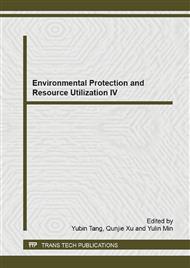[1]
Diana Norton-Brandão, Sigrid M. Scherrenberg, Jules B. van Lie. Reclamation of used urban waters for irrigation purposes e A review of treatment technologies[J]. Journal of Environmental Management , 2013, 122 : 85-98.
DOI: 10.1016/j.jenvman.2013.03.012
Google Scholar
[2]
Junying Chu, Jining Chen, Can Wang, et al. Wastewater reuse potential analysis: implications for China's water resources management[J]. Water Research, 2004, 38: 2746–2756.
DOI: 10.1016/j.watres.2004.04.002
Google Scholar
[3]
Carme Santasmasasa, Miquel Rovirab, Frederic Clarensb, César Valderrama. Grey water reclamation by decentralized MBR prototype. Resources, Conservation and Recycling 2013, 72: 102–107.
DOI: 10.1016/j.resconrec.2013.01.004
Google Scholar
[4]
Revitt DM, Eriksson E, Donner E. The implications of household greywater treatment and reuse for municipal wastewater flows andmicropollutant loads. WaterResearch 2011, 45: 1549–1560.
DOI: 10.1016/j.watres.2010.11.027
Google Scholar
[5]
Hochstrat, R., Joksimovic, D., Wintgens, T., Melin, T., Savic, D. Economic considerations and decision support tool for wastewater reuse scheme plan-ning. Water Science & Technology, 2007, 56 (5): 175-182.
DOI: 10.2166/wst.2007.570
Google Scholar
[6]
Feng Kai. Upgrading and reconstruction process design for the Gaobeidian Reclaimed Water Treatment Plant in Beijing City. Water Supply and Drainage, 2012, 38(12), 35-39.
Google Scholar
[7]
Zhao Quanqi. Utilization of recycled water and its development in Tangshan City[J]. Public Uitlities, 2012, 26(1): 31-33.
Google Scholar
[8]
Lei Qinli. Multivariate statistical analysis of economic management[M]. Beijing: Statistical Press of China.
Google Scholar
[9]
YU Shu-jun. Origin of Sustainable Development and Scientific View ofDevelopment[J]. J. ofWuhanUn. i ofSc. i&Tech. (SocialScience Edition), 2006, 8(1): 76-79.
Google Scholar
[10]
Liang Bao-ping, Huang Fang, Chen Bin, et al. Comprehensive Evaluation of the Sustainable Development of an Ecological Demonstration District[J]. Bulletin of Soil and Water Conservation, 24(1): 74-78.
Google Scholar
[11]
Bai Xianchun, Ling Kang, Guo Cunzhi. The selection index system of sustainable development of city[J]. Chinese Public Administration, 2009, 10: 52-56.
Google Scholar
[12]
Min Qing-wen, Li Wen-hua. Assessment of Regional Sustainability and Its Application in Wulian County of Shandong Province[J]. Acta Ecologica Sinica, 2002, 22(1): 1-9.
Google Scholar
[13]
Su Zen-min, Lin Bing-yao. Quantitative Analysis on Urban Sustainable Development Degree and Its Phase States[J]. Areal Research and Development, 2006, 25(1): 10-12.
Google Scholar


